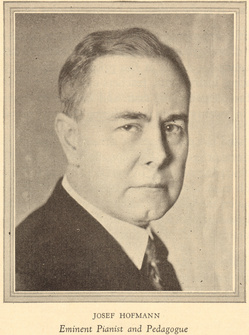An Incredible Mental Achievement
FOR many years THE ETUDE MUSIC MAGAZINE has been stressing the great advantages of music study as a mind trainer. We have contended with the late President Eliot of Harvard that “Music properly taught is the best mind trainer on the list.” What does this superlative statement mean? It implies that the individual who is taught music thoroughly has the advantage of a mental drill so extraordinary that the average intellectual attainments of the average person must suffer by comparison.
 Let us take the extreme case of the accomplishments of a great virtuoso. We asked Mr. Josef Hofmann for a representative program with a view to having the mental operations analyzed and audited. Mr. Hofmann sent us the following:
Let us take the extreme case of the accomplishments of a great virtuoso. We asked Mr. Josef Hofmann for a representative program with a view to having the mental operations analyzed and audited. Mr. Hofmann sent us the following:Bach-Liszt, Fantasia and Fugue in G Minor.
Beethoven, Sonata, Opus 106.
Chopin, Ballade in F Minor.
Chopin, Prelude, Opus 28, No. 1.
Chopin, Prelude, Opus 28, No. 8.
Debussy, Soirees dans Granada.
Bokafrepf, Marche in F Minor.
Strauss-Godowsky, Hedermains.
This program was placed in the hands of a member of our staff with a view to estimating accurately all of the mental operations involved. The work of counting the operations (notes and fingering, accidentals, interpretation, rests, pauses, phrasing, pedaling, metre, rhythm, and other details) took this musical expert nearly a week to audit and collate, and this with the assistance of an adding machine. The result was that 319,418 operations were required in a program which Mr. Hofmann presents in not more than ninety minutes of playing time. This indicates that Mr. Hofmann’s mind travels consciously and sub-consciously at an average rate during this period of about 4,000 operations a minute. In no other life calling is a greater demand made upon the human brain muscles and nervous system. The musician’s brain flies ahead at an aeroplane speed which makes that of the average man appear like the old-fashioned stage coach. More than this, every note must be delivered with the extreme split second accuracy of a chronometer. Every note must have the right accent, touch, length and must bear its proper relation to the lofty aesthetic demands of an artistic masterpiece. Still more, this is only one program among scores which the virtuoso pianist is expected to retain from memory in his repertoire. His mental achievements, therefore, make those of the average professional man and the average business man appear like mere pygmies.
This giant intellectual work is reserved for the specialist, the virtuoso. However, all music study has a proportionate effect in quickening the mental machinery, sharpening the wits, improving the memory, and establishing better mind and muscle co-ordination. Time and again in THE ETUDE we have published lists of men and women who have had a fine musical training in youth, and have willingly stated that their life success in other callings has been helped by the mental discipline afforded by music. We know of one man, in fact, whose name is well known to ETUDE readers, who was in the professional musical field until he was over fifty. He then went into business and soon occupied one of the finest and most lucrative managerial positions in the country. Another case is that of one of our best American composers whose works have been done at the Metropolitan and by our great Symphony Orchestras. This gentleman conducts a highly successful mercantile business said to gross over $2,000,000 a year. These facts have been stressed in THE ETUDE to convince practical parents of the enormous mind sharpening value of music study. Music study will not turn a fool into a wise man, but it will in almost every case enormously help all who have the opportunity to engage in it. We have made this curious census of Mr. Hofmann’s achievements (which is similar to that of all great virtuoso pianists) because it will assist many unthinking people to gain a new respect for the brain capacity of musicians. No wonder that Ralph Modjeski became a master of mathematical detail, that made him the world’s greatest bridge builder. His training and practice of music imposed intellectual feats even greater. Examine the score of Parsifal and you will find a piece of artistic engineering beside which the average plan for a huge structure pales into insignificance.



